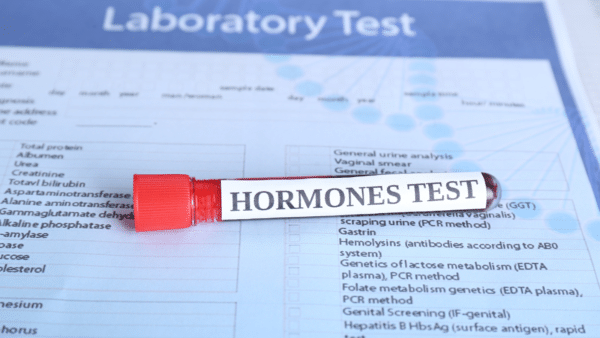Introduction
You wake up one day feeling like something’s off. You’re tired and moody, and your body seems to undergo changes you can’t quite explain. You brush it off, thinking it’s just a temporary thing, but as days pass, your symptoms persist.
What you might not realize is that these could be signs of an underlying hormonal imbalance – something that’s not uncommon in men. Hormones, like little messengers in your body, play a crucial role in regulating everything from your metabolism to your reproductive health. They’re like conductors in an elaborate symphony of life processes.
To better understand what’s going on, male hormone testing has become an essential tool. It’s not just about detecting typical hormone issues; it’s about giving you a roadmap to optimize your health. By assessing testosterone levels, cortisol, and other vital hormones, these tests reveal important information about your overall health and serve as a cornerstone of preventive healthcare.
So, if you’re experiencing symptoms like fatigue, mood swings, or physical changes that you can’t explain, it might be time to consider getting a hormone test. Don’t wait for things to get worse – take control of your health and get the insights you need to improve your strategy. After all, you only have one body – why not make sure it’s working at its best?

What is Male Hormone Testing?
Have you ever wondered how hormones work in your body? Hormones are like messengers that play vital roles in regulating type of physiological processes and maintaining balance within your body. From controlling metabolism and muscle growth to influencing mood and libido, hormones are essential for your overall health.
Male hormone testing is a precise diagnostic method that helps measure the levels of specific hormones in your bloodstream. It’s like reading a detailed blueprint that reveals the operational status of these biological messengers. By taking a simple blood sample, medical professionals can assess the concentrations of hormones like testosterone, which is the primary male sex hormone, and cortisol, that is sometimes referred to as the stress hormone.
Understanding the levels of these hormones provides insights similar to a mechanic examining a car’s engine. It helps identify any discrepancies that might explain symptoms like decreased energy levels or mood fluctuations. Through these tests, doctors can offer targeted interventions, ensuring that each hormone is performing its role effectively, much like tuning an engine for optimal performance.
In essence, male hormone testing acts as a critical health check that ensures all systems are running smoothly, facilitating early detection and management of health issues before theyturn into something more serious conditions. So, it is essential to get your hormone levels checked regularly to maintain good health.
Obese men have 30% lower total testosterone levels than eutrophic men and 40% have levels below the lower limit of normality. – Medicine Journal

What Does a Male Hormone Test Show?
A male hormone test delves deep into the biochemical status of an individual, uncovering the levels of key hormones that dictate a man’s health. Central to this analysis is testosterone, often likened to the fuel that powers myriad aspects of male vitality, from muscle strength and bone density to libido and mood regulation. Equally significant is cortisol, the body’s primary stress hormone, which, in excess or deficiency, can significantly disrupt overall well-being.
The results of these tests are revealing, much like a dashboard that displays the vital statistics of a car’s performance. For instance, elevated testosterone levels may indicate conditions such as polycythemia, whereas low levels could signal hypogonadism or other endocrine disorders. Similarly, cortisol levels that are out of balance can suggest adrenal issues, either hyperfunction (Cushing’s syndrome) or hypofunction (Addison’s disease). Hormones are also linked to hair loss.
Beyond testosterone and cortisol, these tests often measure other hormones such as dehydroepiandrosterone (DHEA), follicle-stimulating hormone (FSH), and luteinizing hormone (LH), each playing a unique role in maintaining hormonal harmony. Abnormal levels can provide critical clues about a variety of conditions, from fertility issues to metabolic challenges.
Ultimately, a male hormone test acts as a comprehensive health audit, offering actionable insights that guide medical professionals in tailoring personalized treatment plans. It’s a proactive approach to health management, ensuring that each man can maintain optimal hormone balance for better overall health.

Why Men Might Get a Hormone Test: Signs and Symptoms
Understanding when to seek a male hormone test is crucial, as the signs and symptoms of hormonal imbalances can be subtle yet impactful. These indicators may mimic everyday stresses or misalignments, but like a slowly leaking tire, they gradually draw from the body’s overall functionality and vitality.
Common symptoms prompting a hormone test include unexplained fatigue and a noticeable decline in energy levels, akin to a car that struggles to accelerate. Mood changes, such as increased irritability or uncharacteristic sadness, can also signal hormonal disruptions, resembling a radio that intermittently loses signal. Additionally, changes in libido and sexual performance are significant markers, often reflecting the hormonal ebb and flow similar to the fluctuating speeds of a variable-speed fan.
Physical manifestations might include weight gain, particularly around the abdomen, or muscle weakness, both of which can indicate hormonal shifts comparable to a misadjusted thermostat affecting a house’s temperature. Moreover, sleep disturbances and changes in hair density or skin texture further underline potential hormonal issues, offering clues as tangible as changes in a car’s oil viscosity.
For many men, these symptoms could stem from various lifestyle or environmental factors; however, when persistent or combined, they warrant a deeper look through hormone testing. This proactive step can be likened to a comprehensive system diagnostic in a sophisticated machine, aiming to pinpoint specific problems and facilitate targeted interventions.
By addressing these symptoms with hormone testing, men can gain insights into their health akin to reading a finely detailed map, guiding them toward necessary adjustments and optimizations in their health journey.

Types of Male Hormone Blood Tests
Navigating the landscape of male hormone blood tests can be akin to choosing the right tool for a specific task—each test offering unique insights into the body’s hormonal environment. Broadly, these tests can be classified into several types, each designed to meet different diagnostic needs.
- Baseline Hormone Panel: This test acts as the initial screening tool, providing a snapshot of the primary hormones that influence male health. It’s akin to a basic health check-up, essential for establishing a foundation for further investigation.
- Comprehensive Hormone Panel: More detailed than the Baseline, this panel includes additional markers and provides a deeper look into the hormonal blueprint of an individual. It’s comparable to a full system diagnostic that uncovers more intricate details about the body’s hormonal machinery.
- Specialized Hormone Panels: These are tailored to specific conditions or symptoms, such as fertility issues or adrenal function. Each panel is like a customized tool designed to target particular aspects of hormonal health, ensuring precise diagnosis and tailored treatment plans.
Choosing the right type of hormone test is crucial, much like selecting the appropriate gear in a finely tuned sports car—it ensures optimal performance and precise outcomes.
| Panel Name | Purpose and Focus | Components | Ideal For | Key Insights |
|---|---|---|---|---|
| Baseline Blood Test Panel for Men | Establishes a foundational hormonal assessment akin to a preliminary survey. | – Testosterone: Essential for sex drive, muscle mass, energy. Cortisol: Affects mood, stress response. DHEA-Sulfate: Supports hormone production and immune function. | Men experiencing symptoms like fatigue, mood instability, and decreased libido are useful at the start of health optimization or for middle-aged men. | Identifies basic hormonal landscape; results indicate normal or abnormal levels, guiding further diagnostic testing or lifestyle adjustments. |
| Essential Blood Test Panel for Men | It provides a comprehensive evaluation, offering a more detailed view than the baseline panel. | – Total and Free Testosterone – FSH and LH: Regulate testosterone production, crucial for reproductive health. – Estradiol: Important for bone health and hormonal balance. | Men with complex symptoms like persistent fatigue, erectile dysfunction, and significant weight gain are suitable for those on hormone replacement therapy. | Broader hormonal assessment helps pinpoint specific dysfunctions, enabling more nuanced treatment strategies akin to using sophisticated tools for fine-tuning. |
| Extreme Blood Test Panel for Men | It offers the most detailed and comprehensive hormonal evaluation available, similar to a full-scale audit. | – Includes all hormones from the Essential Panel – Prolactin: Influences testosterone and sexual health. – SHBG: Essential for understanding active testosterone level. – IGF-1: Indicates anabolic status, crucial for muscle growth. | Men with severe symptoms unresolved by basic panels, or those with complex health conditions needing detailed analysis, suitable for athletes or those with significant endocrine disorders. | It provides a holistic view of hormonal health, detecting subtle imbalances or early signs of issues. It enables precise adjustments to lifestyle or treatment plans, combining detailed mapping with a high-powered analysis. |
Conclusion
Understanding and monitoring hormone levels is essential for maintaining optimal health, much like regular maintenance ensures the longevity and performance of a high-end vehicle. Male hormone tests are not just diagnostic tools; they are instrumental in proactive health management, allowing men to make informed decisions about their health and lifestyle.
For those experiencing any of the symptoms discussed, or for men who simply wish to stay informed about their hormonal health, consulting with a healthcare provider to discuss hormone testing is a wise step. This is akin to consulting with a skilled mechanic who can interpret the complex data from a car’s diagnostic test and recommend the best course of action.
As we’ve explored the various panels available—from the Baseline to the Extreme—each serves a specific purpose in providing a comprehensive view of hormonal health. By taking charge of this aspect of their well-being, men can enhance their quality of life and potentially prevent health issues before they become serious.
We encourage all men to consider hormone testing as part of their regular health check-ups, ensuring that they keep their ‘machinery‘ in peak condition, ready to tackle the challenges and opportunities of life.

